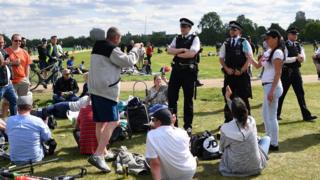Coronavirus: Report 'rule of six' breaches, minister urges
 Image copyright
Getty Images
Image copyright
Getty Images
People should report their neighbours for any suspected breaches of new "rule of six" limits on social gatherings, the crime minister has said.
Kit Malthouse urged residents to pass on details of suspected law-breaking through non-emergency numbers.
From today, new rules restrict indoor and outdoor gatherings in England and Scotland, and indoor groups in Wales.
They come after the UK's reproduction, or R, number escalated to between one and 1.2 for the first time since March.
A further 3,330 positive cases were recorded in the UK on Sunday - the third consecutive day with more than 3,000 - with five more deaths reported.
According to the UK government's coronavirus dashboard, the total number of reported coronavirus deaths across the UK is 41,628.
Asked on BBC Radio 4's Today programme whether a person should report a gathering of seven or more in a neighbour's garden, Mr Malthouse said: "It is open to neighbours to do exactly that through the non-emergency number.
"And if they are concerned and they do see that kind of thing, then absolutely they should think about it."
The crime and policing minister added there were "discussions about what reporting mechanisms there might be, but there is obviously the non-emergency number (101) that people can ring and report issues they wish to".
National Police Chiefs' Council (NPCC) chairman Martin Hewitt denied that enforcement of the rule of six relies on people "grassing up" their neighbours.
"It relies on all of us being responsible," he told BBC Breakfast.
At-a-glance: What are the new rules?
"We will carry on enforcing these in the same way we have been doing this for what's now nearly six months," he added.
"We're part of the group that are trying to explain to members of the public what the rules are and encouraging people to comply with them."
Home Secretary Priti Patel earlier urged the public not to break the rules, saying the recent rise in cases made it clear more needed to be done to stop the spread.
Labour leader Sir Keir Starmer told LBC he backed the government's new rules, adding: "You can make the argument of why not five or why not six or seven - you have to go with a number backed by the science and they say six and I think we should abide by that rule."
Later, it was announced Sir Keir would self-isolate, after a family member showed possible coronavirus symptoms.
Under the new rules, larger gatherings are still allowed at gyms, schools, places of worship, weddings and funerals. Education and work settings are not affected.
The "rule of six" in England - hailed as "super simple" by Health Secretary Matt Hancock - replaces the current guidance on allowing two households to meet indoors and a previous ban on gatherings which exceeded 30 people.
England, Scotland and Wales each have new restrictions, with several key similarities and differences.
Long road to normality
The new "rule of six" is a reminder coronavirus - and the restrictions placed on our lives - are far from over.
Scientists say a rise in cases is not just confined to hotspots like Bolton, but is being witnessed up and down the country.
That cannot be tackled with just "local lockdowns" hence national rules for all of us, albeit with slightly different flavours in the UK's devolved nations.
And there may be more to come. It is anticipated coronavirus will get harder to contain through winter.
A multitude of bugs - from flu to the common cold - find it easier to spread when it is cooler and we spend more time indoors.
But coronavirus cases are increasing now, in summer - which technically ends next week.
Levels are still far lower than when they peaked in March, the virus is spreading far more slowly than pre-lockdown and the actions being taken now are aimed at preventing another lockdown.
But the road to normality remains a long one.
Groups larger than six can be broken up by police, with members of the group facing fines of £100 for a first offence, doubling on each further offence up to £3,200.
Northern Ireland announced a six person, two household limit on indoor gatherings on 24 August, a reduction on a previous restriction of 10 people from four households.
The devolved nations have powers to set their own coronavirus restrictions, and while the UK nations have broadly moved in the same direction, they have done so at their own pace during the pandemic.
The Metropolitan Police said it will deploy resources across the capital to enforce the tighter restrictions on social gatherings.
But the West Yorkshire Police Federation, which represents rank-and-file officers, warned that staff are already so stretched that relying solely on the police to enforce the new law is unrealistic.
Some Tory MPs have urged No 10 to exempt young children in England and called for a debate over the rules.
In other developments:
How will the new rules affect you? Do you have a question about them? If you have had a coronavirus test what was the process like? Tell us by emailing haveyoursay@bbc.co.uk.
Please include a contact number if you are willing to speak to a BBC journalist. You can also get in touch in the following ways: